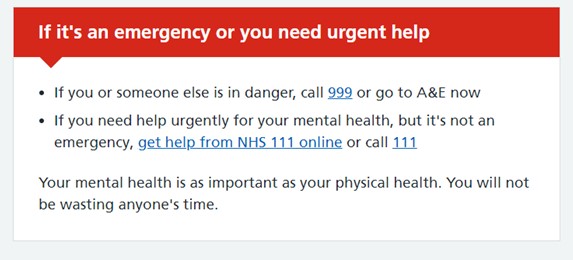Welcome to the wellbeing page. Mental Health and Wellbeing are a high priority at Cambourne VC.

At Cambourne Village College we take the mental health and well-being of our community seriously. We believe that everyone should feel safe and happy when they are on our site, and we believe that well-being is fundamental to ensuring that each individual who makes up our community thrives.
There are many provisions in place at our school to support this goal. Our safeguarding team, the Link, Centre, medical room, View, and Blue Room all play a vital role in our strategic support of targeted students, and these provisions are run by professionals fully qualified in their field of expertise.
In addition, there are groups like the LGBTQ+ (We are all made of Molecules) and Not Just Black and White groups that focus on supporting children and celebrating the wonderful diversity which makes Cambourne Village College the unique and special place it is.
There are many diverse extra-curricular activities available for our students to take part in, whether they are creative, sporty, scientific, or just provide down time and a safe place for students to share their hobbies and interests. Our focus on pupil premium students also ensures that we identify and meet the needs of specific children who might find themselves disadvantaged in certain areas. This might range from providing porridge (to ensure all students have to opportunity to start the day with a nourishing breakfast), to providing uniform or food vouchers for the holidays, and opportunities which help develop the cultural capital of our students.
Key to the wellbeing support offered is the role that the year teams play with the Heads and Assistant Heads of Year, and the Pastoral Support Assistants. We also have vital access to external providers such as counselling services and CAMHS.
All staff engaged in pastoral support at every level are provided with a variety of up-to-date training and information, and meetings take place regularly to keep abreast of the best external providers and their named contacts. There is a regular well-being meeting where the needs of each year group are discussed with invested parties, to try and ensure that all the pastoral teams in school are working together to provide the best safety net for all of the students in our care.
We also have mentoring teams which offer one to one or group mentoring for students who are referred for a bit of extra support with their daily life at school. There is a teacher led team and a peer support team. The peer support team is made up of prefects and mental health ambassadors who are trained in supporting mental health and wellbeing, and who are fully conversant with the set school procedures relating to safeguarding.
Some SEMH opportunities implemented 2022/23
We are committed to supporting the well-being of everyone in our community and will continue to update and improve initiatives to ensure that everyone has access to the best support available.
At Cambourne Village College, our Link facility provides for young people who need support with their mental health. We also provide a Counselling service and employ fully trained, external counsellors who work with our pupils on a referral basis. Our school counsellors are fully qualified and registered with The British Association for Counselling and Psychotherapy BACP or The Health and Care Professions Council HCPC. Pupils can self-refer for counselling support or staff can refer them, as per the Social Emotional Mental Health Referral process. Whilst we always encourage pupils to speak to their parents about a request for counselling, parents should be aware that this is offered to those pupils who are considered competent as a confidential service if they so wish.
If you have concerns about your child’s well-being that are non-urgent and need advice you can contact your child’s Head of Year or a member of The Link team. If you feel that your child is unable to cope and is a risk to themselves or other people, seek advice from 111 and dial 2 to get support from mental health teams. If you have an emergency, dial 999 to get immediate support.
The Anna Freud centre for children and families has launched a new online support project for everyone to access in order to gain trusted and up to date information on youth mental health and wellbeing. On My Mind is designed as a “one stop shop” for students, covering a comprehensive list of topics. Their website is: https://www.annafreud.org/on-my-mind/
Chathealth is a confidential texting service run by the School Nursing Team (NHS). Their number is 07480635443
You can contact Childline about anything and everything and they have lots of useful tips and advice online, including on keeping calm. Their website is https://www.childline.org.uk/get-support/ and their number is 0800 1111. There is also an email section on their website.
Kooth has online support and there are staff available to talk to Mon-Fri 12pm-10m and Sat-Sun 6pm-10pm. Kooth also have lots of useful articles written by young people and a journal section. https://www.kooth.com/
https://youngminds.org.uk/ Young Minds also have an urgent care text service and you text YM to 85258
https://www.actionforhappiness.org/
https://youngminds.org.uk/blog/what-to-do-if-you-re-anxious-about-coronavirus/
https://youngminds.org.uk/blog/looking-after-your-mental-health-while-self-isolating/
https://youngminds.org.uk/blog/talking-to-your-child-about-coronavirus/
https://www.annafreud.org/what-we-do/anna-freud-learning-network/coronavirus/
https://www.mind.org.uk/information-support/coronavirus-and-your-wellbeing/
What does Mindfulness mean?
Mindfulness means being present and aware of your actions in the moment whilst calmly acknowledging thoughts, feelings and senses.
Why might Mindfulness be useful to try?
Mindfulness focuses on activities you can do to help promote calmness. Mindfulness also looks at ways we can think and be aware of everyday activities. During a challenging time, some of these exercises may be useful to try, whether they are part of your daily routine or a conscious effort to complete a mindful activity.
Mind UK have created some ideas and examples of mindful exercises such as:
Mindfulness can feel like an abstract concept and there are some really helpful YouTube videos to help you understand and explore Mindfulness further such as: